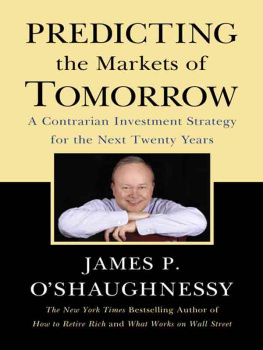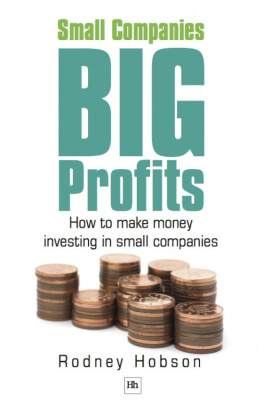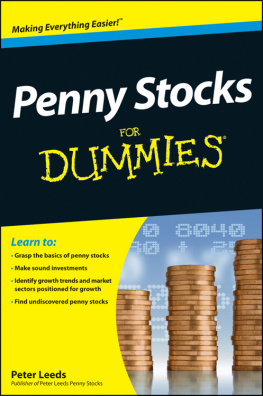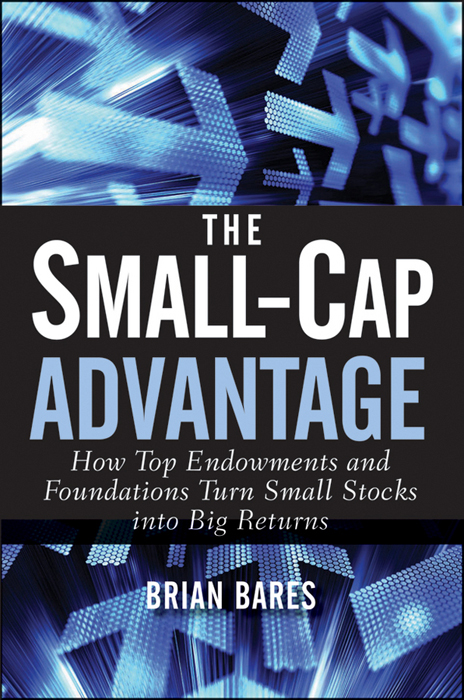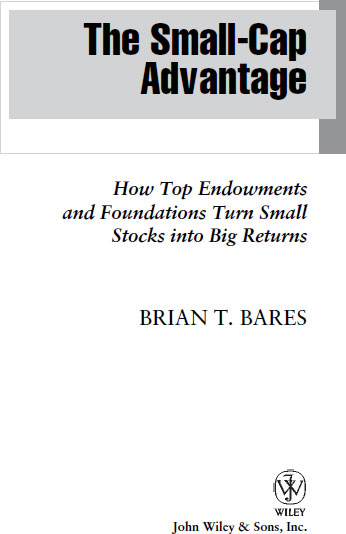Additional Praise for The Small-Cap Advantage
Small-cap investing presents unique opportunities as well as unique challenges. Brian Bares masterfully details both in language that is accessible and actionable for investment novices and pros alike.
John Heins, Co-Editor, Value Investor Insight
President, Value Investor Media, Inc.
Brian Bares is a very talented small-cap stock investor, so it is no surprise that The Small-Cap Advantage is a very worthwhile read. In the ongoing search for investment added value, investment managers are smart to heed the small-cap stock market and Brians thoughtful perspectives on investing in these securities.
Bruce Zimmerman, CEO and CIO, University of Texas Investment
Management Company
The Small-Cap Advantage is a must read for anyone intent on generating superior investment returns in an area of the market that frequently flies below the radar of large investment funds. Brian Bares takes the reader through all the issues a professional investor focused on small caps is likely to encounter, dispensing invaluable data and advice in the process. I cant imagine anyone better to write this much-needed volume than Brian Bares, one of the most highly regarded small-cap super-investors of his generation.
John Mihaljevic, CFA, Managing Editor, The Manual of Ideas
Founded in 1807, John Wiley & Sons is the oldest independent publishing company in the United States. With offices in North America, Europe, Australia and Asia, Wiley is globally committed to developing and marketing print and electronic products and services for our customers professional and personal knowledge and understanding.
The Wiley Finance series contains books written specifically for finance and investment professionals as well as sophisticated individual investors and their financial advisors. Book topics range from portfolio management to e-commerce, risk management, financial engineering, valuation and financial instrument analysis, as well as much more.
For a list of available titles, please visit our Web site at www.WileyFinance.com .
Copyright 2011 by Brian T. Bares. All rights reserved.
Published by John Wiley & Sons, Inc., Hoboken, New Jersey.
Published simultaneously in Canada.
No part of this publication may be reproduced, stored in a retrieval system, or transmitted in any form or by any means, electronic, mechanical, photocopying, recording, scanning, or otherwise, except as permitted under Section 107 or 108 of the 1976 United States Copyright Act, without either the prior written permission of the Publisher, or authorization through payment of the appropriate per-copy fee to the Copyright Clearance Center, Inc., 222 Rosewood Drive, Danvers, MA 01923, (978) 750-8400, fax (978) 646-8600, or on the Web at www.copyright.com . Requests to the Publisher for permission should be addressed to the Permissions Department, John Wiley & Sons, Inc., 111 River Street, Hoboken, NJ 07030, (201) 748-6011, fax (201) 748-6008, or online at http://www.wiley.com/go/permissions .
Limit of Liability/Disclaimer of Warranty: While the publisher and author have used their best efforts in preparing this book, they make no representations or warranties with respect to the accuracy or completeness of the contents of this book and specifically disclaim any implied warranties of merchantability or fitness for a particular purpose. No warranty may be created or extended by sales representatives or written sales materials. The advice and strategies contained herein may not be suitable for your situation. You should consult with a professional where appropriate. Neither the publisher nor author shall be liable for any loss of profit or any other commercial damages, including but not limited to special, incidental, consequential, or other damages.
For general information on our other products and services or for technical support, please contact our Customer Care Department within the United States at (800) 762-2974, outside the United States at (317) 572-3993 or fax (317) 572-4002.
Wiley also publishes its books in a variety of electronic formats. Some content that appears in print may not be available in electronic books. For more information about Wiley products, visit our web site at www.wiley.com .
Library of Congress Cataloging-in-Publication Data:
Bares, Brian T., 1973
The small-cap advantage : how top endowments and foundations turn small stocks into big returns / Brian T. Bares.
p. cm. (Wiley finance series)
Includes bibliographical references and index.
ISBN 978-0-470-61576-8 (cloth); 978-0-470-93969-7 (ebk);
978-1-118-00816-4 (ebk); 978-0-470-93968-0 (ebk)
1. Small capitalization stocks. 2. Institutional investors. 3. EndowmentsFinance. 4. Portfolio management. 5. Investment advisors. I. Title.
HG4971.B37 2011
332.67253dc22
2010031654
For my parents, Harold and Jane Bares
Introduction
Small-cap stocks can provide investors with high relative returns over long time periods. The asset class has provided a return premium over mid-cap and large-cap stocks since the advent of reliable return data. Despite providing superior returns, small-cap stocks present certain challenges for professional investors. These challenges make prospecting in small-cap stocks more difficult, but they also allow investors who properly structure their strategy and limit their capital base an opportunity to experience outsize rewards. Most professional small-cap managers who post market-beating performance begin to experience an influx of capital. This expansion forces the manager to adjust by trading smaller companies for larger ones or by increasing the number of portfolio positions. Both of these activities, moving up the market-cap spectrum or increasing diversification, tend to diminish the historical advantage afforded to those who prospect in small-cap stocks. The trends pulling professional investors away from small caps help to illustrate why an unusual opportunity exists in the space. Most professional investors who have been successful have graduated into mid and large caps, while the unsuccessful ones have often lost their clients and left the business. What remains is a dynamic opportunity set filled with relatively inexperienced participants. In this environment, classic market inefficiencies are present. Opportunistic investors who limit their capital base and diligently work to understand and exploit these inefficiencies have a legitimate opportunity to post sustained market-beating returns.
This book is meant for aspiring professionals who wish to undertake the treasure hunt in small caps on behalf of institutional clients. It is also written for institutional investors who are looking to hire specialist small-cap managers. Consultants, endowment-model investors, and other institutions must understand the unique challenges and opportunities that separate small-cap managers from their peers in mid and large caps. These investors must have insight into the motivations, strategies, philosophies, and processes of small-cap managers in order to handicap their potential to post market-beating returns. They must also be aware of the pitfalls and traps that cause small-cap managers to underperform.
The part-time investment hobbyist who takes more than a passing interest in small-cap stocks may glean some valuable insight from this book. Serious investment hobbyists who do their own research and manage their own investment portfolios tend to gravitate toward smaller companies for many of the reasons that I articulate in this book. I have a certain reverence for these individuals. I was one of them in my formative years. My fascination with business and my passion for common stock analysis naturally pulled me in the direction of my present career as an institutional manager of small-company common stocks. My intent is to provide practical insight for professionals, aspiring professionals, and the institutions that would hire them, but my technical discussions of the industry, firm structure, investment philosophy, and process should be easily understandable by part-time investment hobbyists. The information in this book should improve their understanding of how institutional small-cap investing can evolve from a passionate hobby into a rewarding career.




